Special Report
The Most Infamous Criminal From Every State
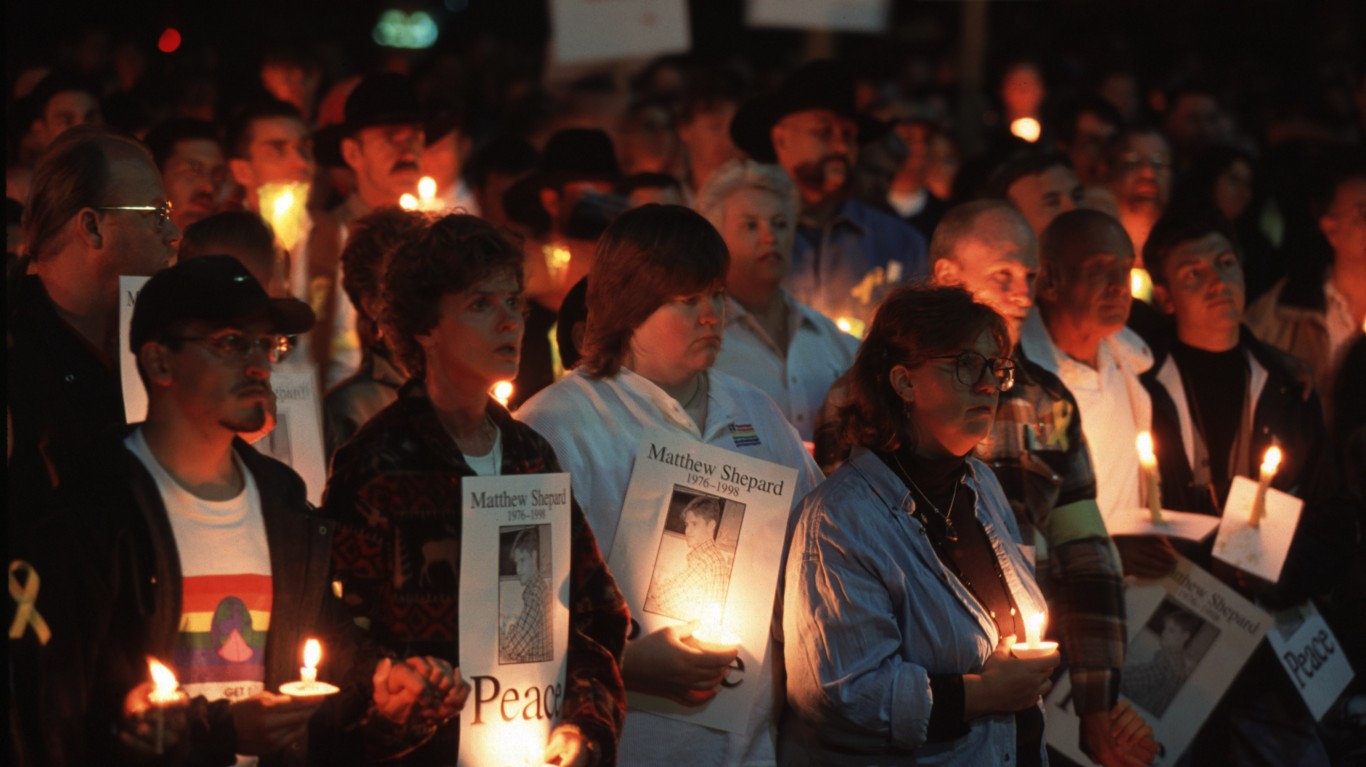
Published:

Every state has produced at least one criminal whose deeds were so heinous or have effects that are so far-reaching that they become truly infamous.
To compile a list of the single most infamous criminals from every state, 24/7 Tempo drew on sources such as Britannica, History, Biography, Reader’s Digest, PBS, Crime Museum, and various local media. Criminals noted here are included based on their native states, not necessarily where their crimes were committed. For example, Ted Bundy, who killed people in the Pacific Northwest and Florida, is originally from Vermont, so is listed as that state’s most infamous criminal. (These are 25 of the most brutal criminals who have ever lived.)
Note that most of the criminals on this list were guilty of many crimes and may have served time for other offenses than those mentioned here.
Almost all the criminals on our list were serial or mass murderers, though there are a few exceptions, including several white-collar felons whose misdeeds upended the lives of thousands of people beyond the borders of their state. (Here’s a look at the most infamous white collar criminals of all time.)
Many of these criminals were sentenced to life in prison without possibility of parole or were executed. Eight wrongdoers, however, cheated justice by committing suicide before they were being apprehended or killed themselves in jail. A handful have been paroled or served their terms.
Click here to read about the most infamous criminal from every state
The iniquities of these perpetrators have been well chronicled in motion pictures and television. One of the early movies to depict a serial killer was “The Boston Strangler” (1968), starring Tony Curtis in the title role. “To Catch a Killer” (1992) featured Brian Dennehy as the Wisconsin serial murderer John Wayne Gacy. Robert De Niro starred as Wall Street Ponzi schemer Bernie Madoff in “The Wizard of Lies” (2017)/ The Columbine school killings in Colorado were brought to the big screen with the film “I’m Not Ashamed” (2016).
Alabama: Nannie Doss
> Crime(s): Serial murder
> When the crime(s) took place: 1920s-1953
> Criminal(s)’s fate: Died of leukemia while serving a life sentence
In 1955, Doss was convicted by the state of Oklahoma of having killed one of her husbands, but she also confessed to having slain three others, plus her mother, her sister, her grandson, and her mother-in-law.
[in-text-ad]
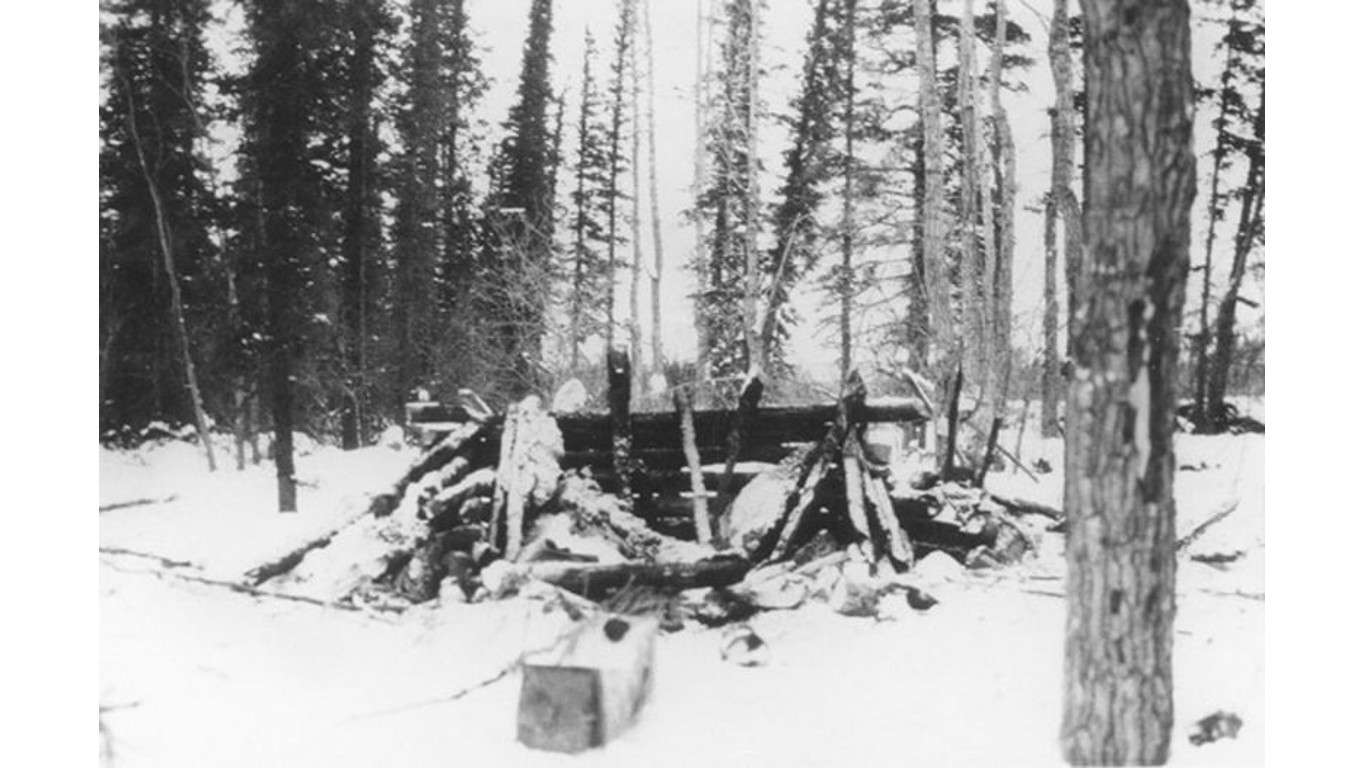
Alaska: Klutuk
> Crime(s): Serial murder
> When the crime(s) took place: Early 20th century
> Criminal(s)’s fate: Believed to have been found dead in 1938.
Known as the Mad Trapper of Bristol Bay, Klutuk was an indigenous Yupik trapper, followed everywhere by a black dog, who killed a number of other trappers, both white and Eskimo, in the wild with an ax and a gun.

Arizona: Dale Hausner and Samuel Dieteman
> Crime(s): Serial murder and arson
> When the crime(s) took place: 2005-2006
> Criminal(s)’s fate: Serving life without possibility of parole (Dieteman); sentenced to death but committed suicide in 2013 (Hausner)
The pair killed at least eight people and 10 animals, apparently chosen at random on the streets, mostly while high on methamphetamine. They are also believed to have shot at least 29 others non-fatally. Hausner’s brother Jeff was involved in some of the crimes and was himself given a 25-year sentence. (Hausner is an Arizona native, but Dieteman’s birthplace is unknown.)
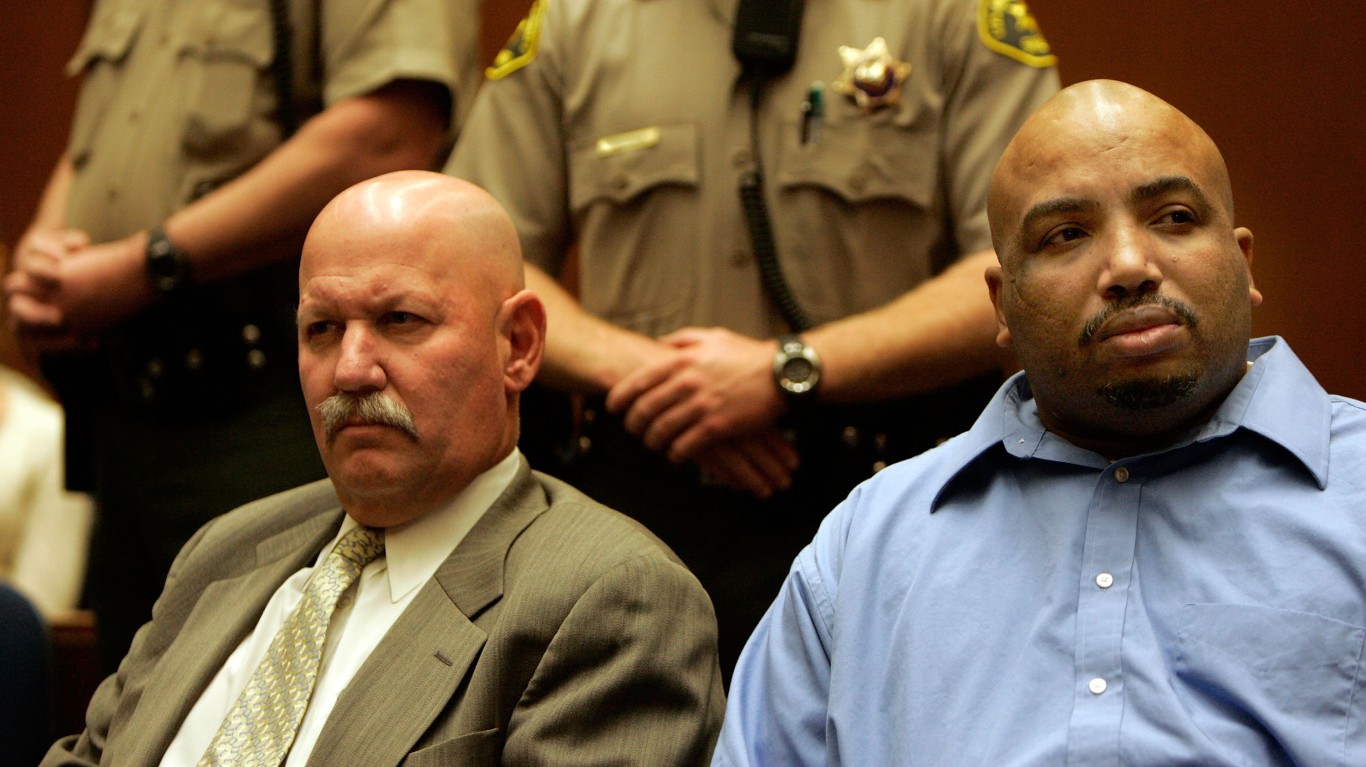
Arkansas: Chester Dewayne Turner
> Crime(s): Serial murder
> When the crime(s) took place: 1987-1998
> Criminal(s)’s fate: Currently on death row
Arkansas-born Turner moved to Los Angeles with his mother when he was 5, embarking on a series of serial murders when he was 21, earning the nickname “The Southside Slayer.” He was convicted of the murders of 10 women around L.A. in 2007, and of four more murders in 2014. He earned a death sentence, as yet to be carried out, in both trials.
[in-text-ad-2]
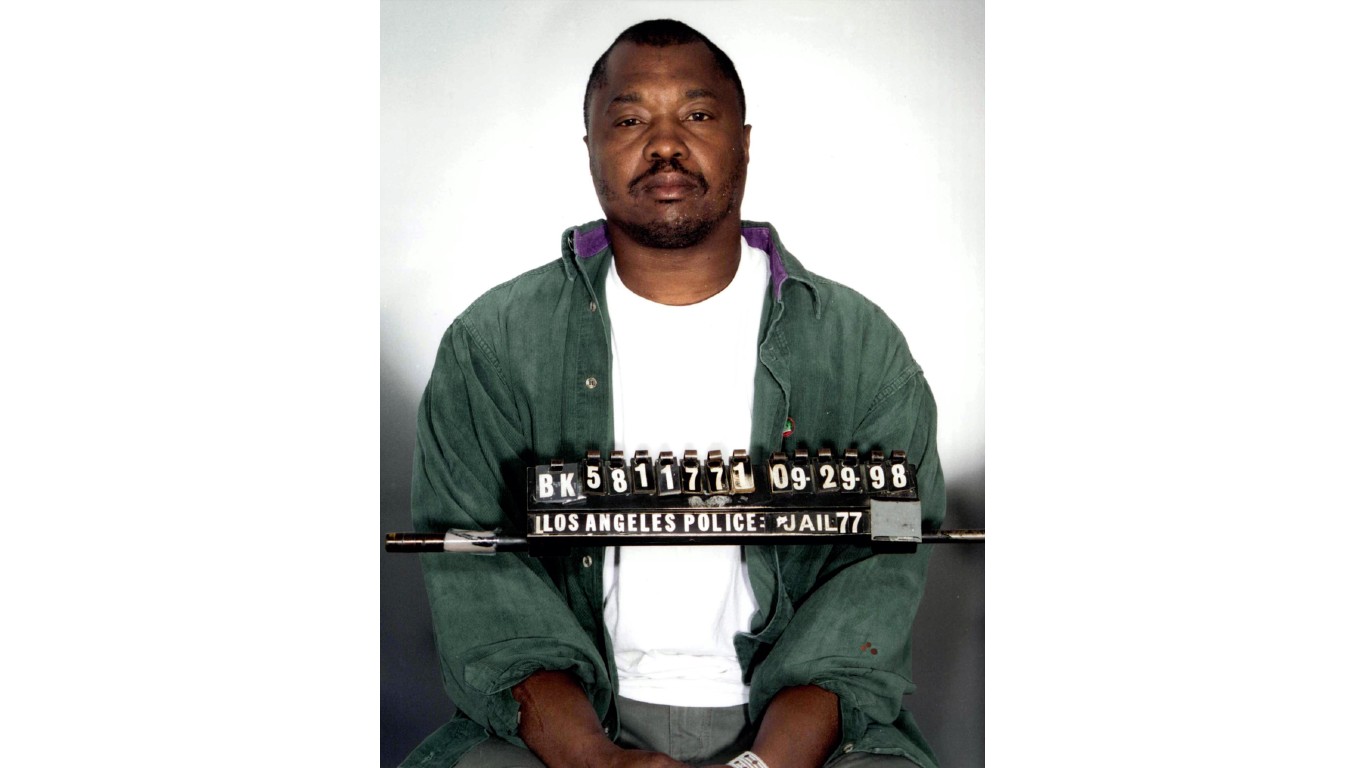
California: Lonnie David Franklin Jr.
> Crime(s): Serial murder, rape
> When the crime(s) took place: 1984-2007
> Criminal(s)’s fate: Found dead in his cell on death row
While in the army in Germany in 1975, Franklin was convicted in taking part in the gang rape of a 17-year-old girl. Back in the U.S., he began a killing spree that eventually claimed at least ten women. He earned the nickname “The Grim Sleeper” because he apparently took a 14-year break from his killings, from 1988 to 2002.
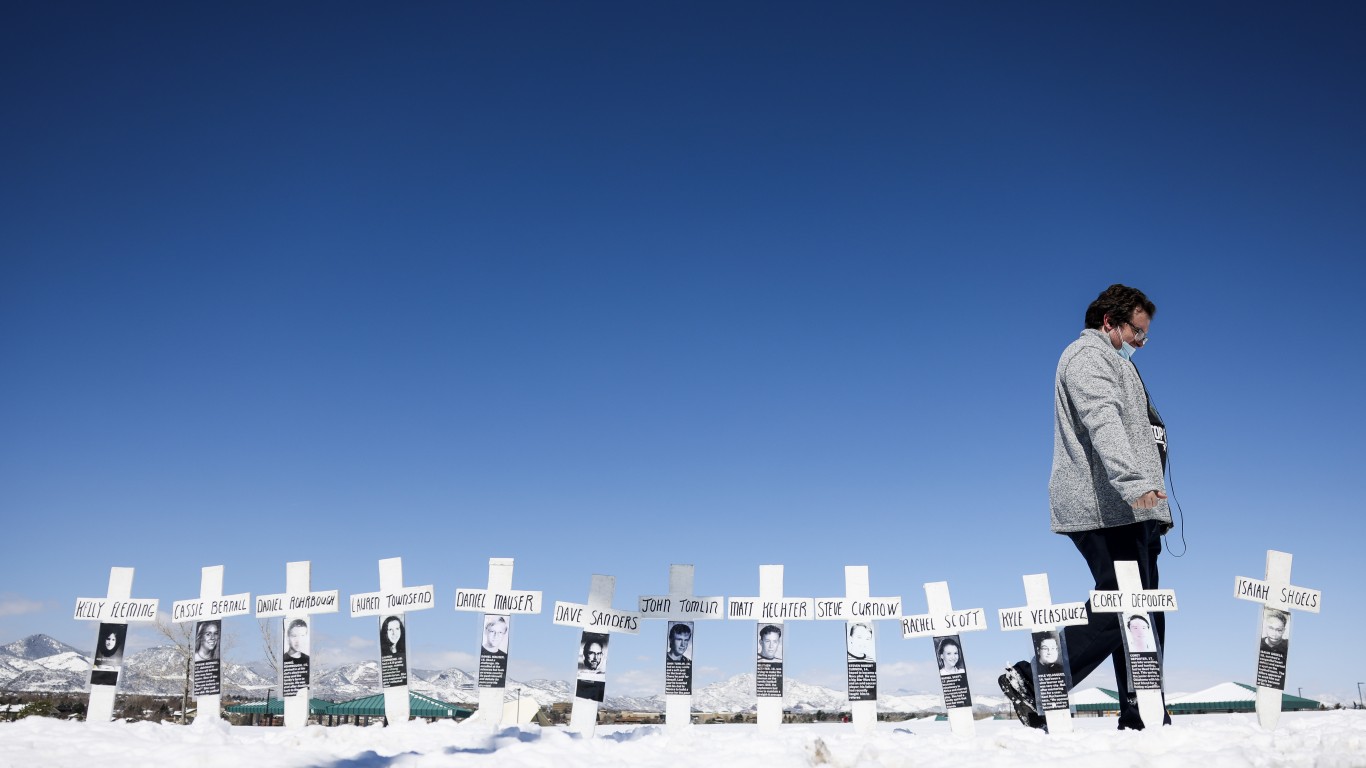
Colorado: Dylan Klebold
> Crime(s): Mass murder
> When the crime(s) took place: 1999
> Criminal(s)’s fate: Committed suicide
In the days before horrific school shootings became almost commonplace, Dylan Klebold and his accomplice, Kansas-born Eric Harris, killed 12 students and one teacher and wounded 24 other people in an assault on Columbine High School in the Colorado city of Columbine, then shot themselves in the school library. At the time it was the worst school shooting on record.
[in-text-ad]
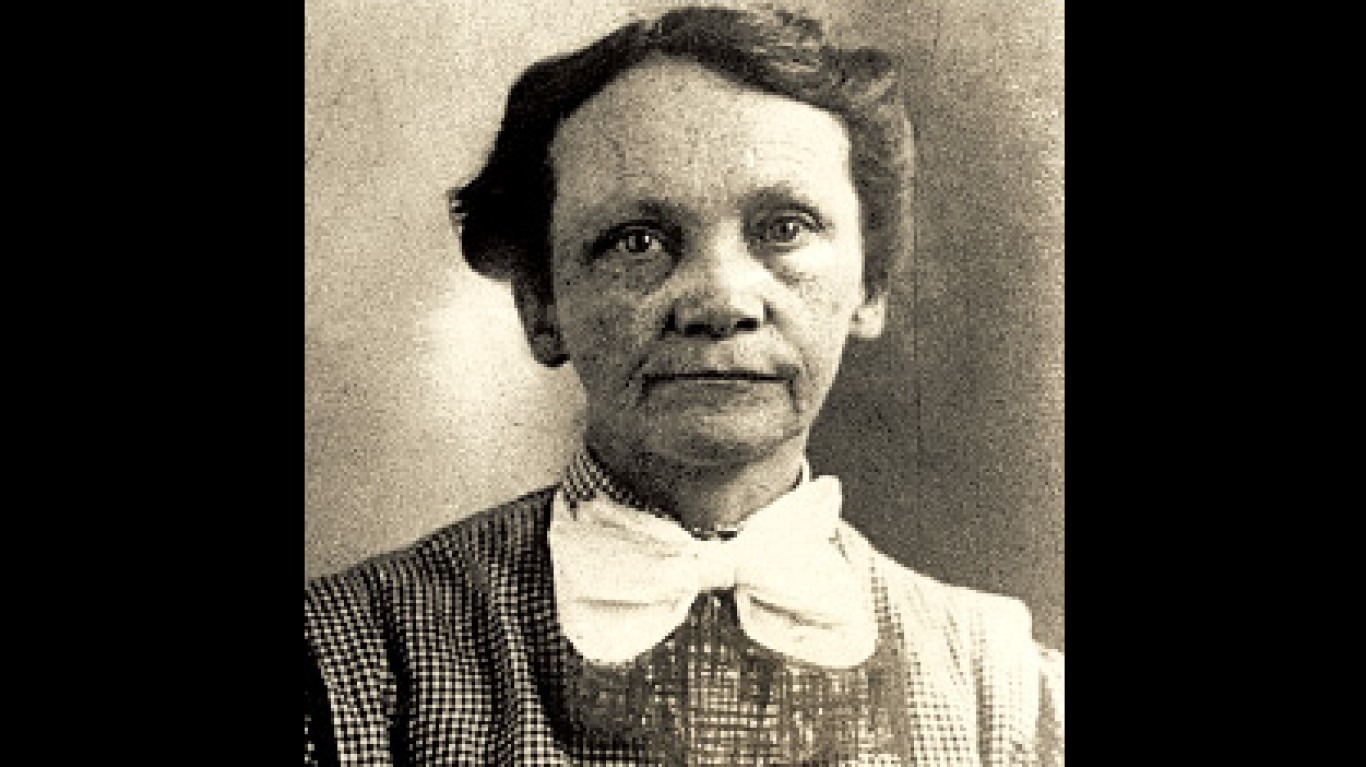
Connecticut: Amy Archer-Gilligan
> Crime(s): Serial murder
> When the crime(s) took place: 1907-1917
> Criminal(s)’s fate: Sentenced to death, but transferred to a hospital for the insane, where she died at the age of 89
Archer-Gilligan, born Amy Duggan, ran a nursing home in Windsor, Connecticut, where she poisoned at least five people – and perhaps as many as 48 – including her second husband, reportedly to collect her victims’ life insurance policies. The case won wide attention at the time and is said to have been the inspiration for the hit play “Arsenic and Old Lace.”
Delaware: Steven Brian Pennell
> Crime(s): Serial murder
> When the crime(s) took place: 1987-1988
> Criminal(s)’s fate: Executed
Known as “The Route 40 Killer,” Pennell is Delaware’s only known serial killer. He was convicted of the murders of two New Castle County women and suspected of killing three others.
Florida: Paul John Knowles
> Crime(s): Serial murder
> When the crime(s) took place: July-November, 1974
> Criminal(s)’s fate: Shot and killed while under arrest
Known as “The Casanova Killer” for his rugged good looks, Knowles allegedly killed at least 18 people and possibly (according to his claims) as many as 35 in less than a year’s time in Florida and seven other states.
[in-text-ad-2]
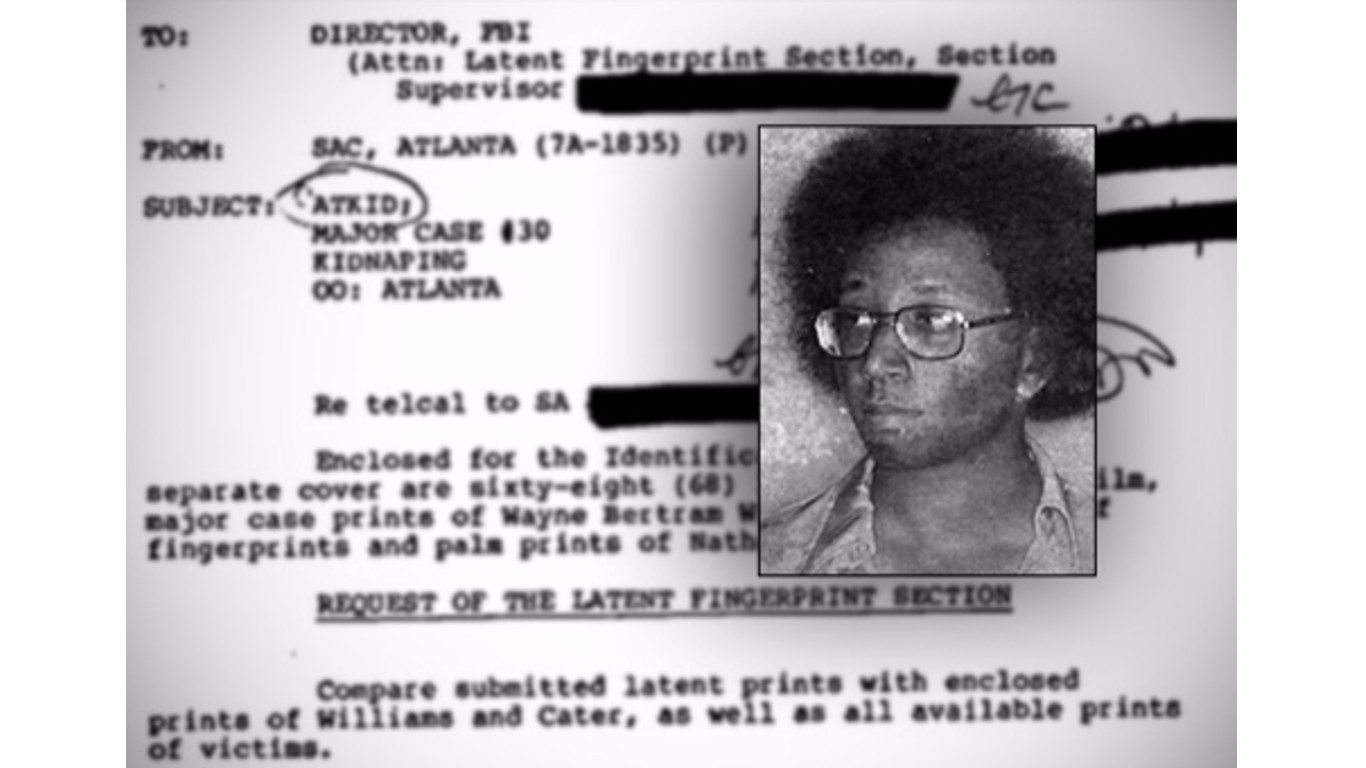
Georgia: Wayne Williams
> Crime(s): Serial murder
> When the crime(s) took place: 1979-1981
> Criminal(s)’s fate: Serving life sentence
Though convicted only of killing two men in Atlanta in 1981, Williams is believed to have been the dreaded “Atlanta Child Killer” – also called “The Atlanta Bogeyman” – who killed at least 24 children in the area over a two-year period.

Hawaii: Byran Koji Uyesugi
> Crime(s): Mass murder
> When the crime(s) took place: 1999
> Criminal(s)’s fate: Serving a 235-year sentence
Giving him the dubious distinction of having committed the worst mass murder in Hawaiian history, Uyesugi murdered six co-workers and a supervisor at the Xerox Corporation building in Honolulu – apparently believing that he was about to be fired.
[in-text-ad]
Idaho: Paul Ezra Rhoades
> Crime(s): Serial mMurder
> When the crime(s) took place: 1984(?)-1987
> Criminal(s)’s fate: Executed
Rhoades was convicted of the 1987 kidnapping and murders of 34-year-old Susan Michelbacher and 21-year-old Stacy Dawn Baldwin and the murder of 20-year-old Nolan Haddon, receiving a sentence of death for the first two crimes and life imprisonment for the third. He was also believed to have been responsible for four other murders, several years earlier, in Utah and Wyoming. His execution in 2011 was the first time the death penalty had been carried out in Idaho in almost 18 years.
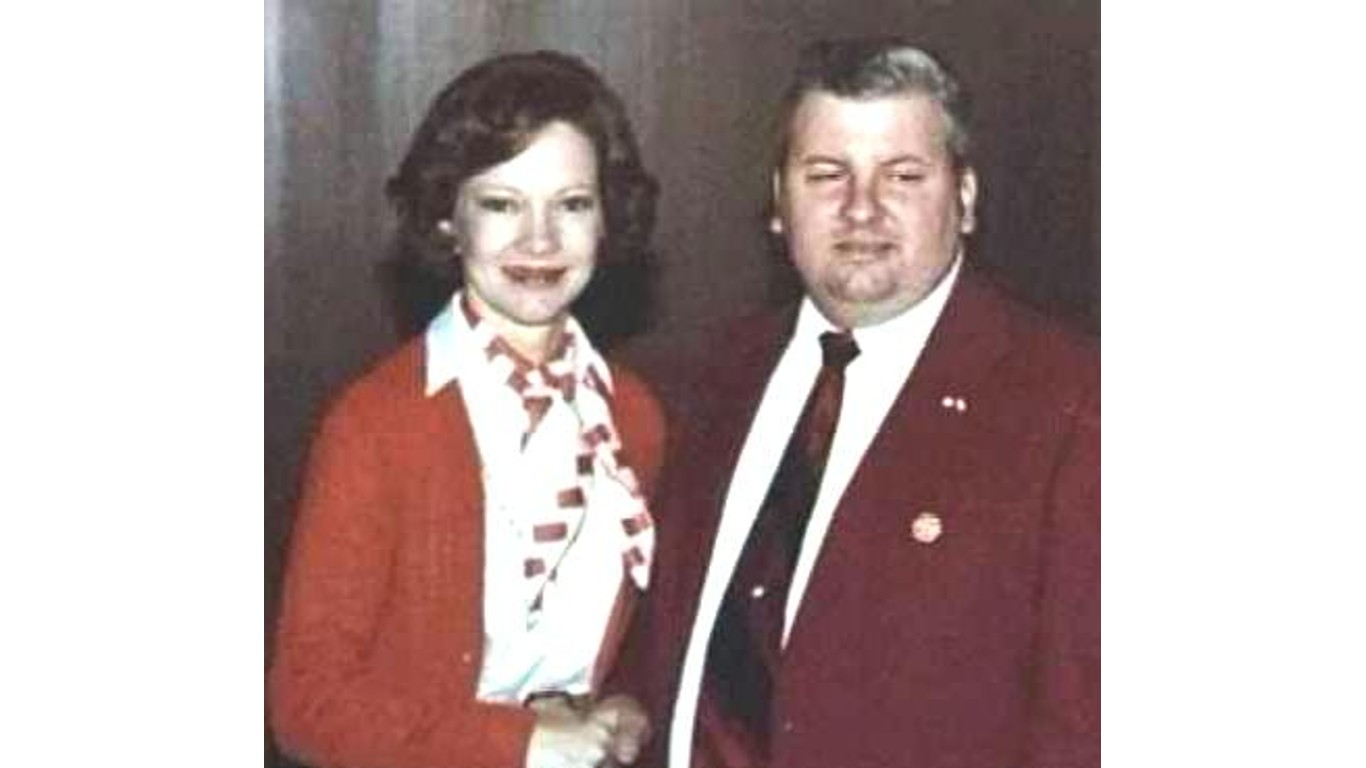
Illinois: John Wayne Gacy
> Crime(s): Rape, torture, serial murder
> When the crime(s) took place: 1967-1978
> Criminal(s)’s fate: Executed
One of the nation’s most notorious serial killers, called “The Killer Crown” because he dressed as a clown for charity events, Gacy sexually abused, tortured, and killed 33 men and boys, and possibly more, over an 11-year period.
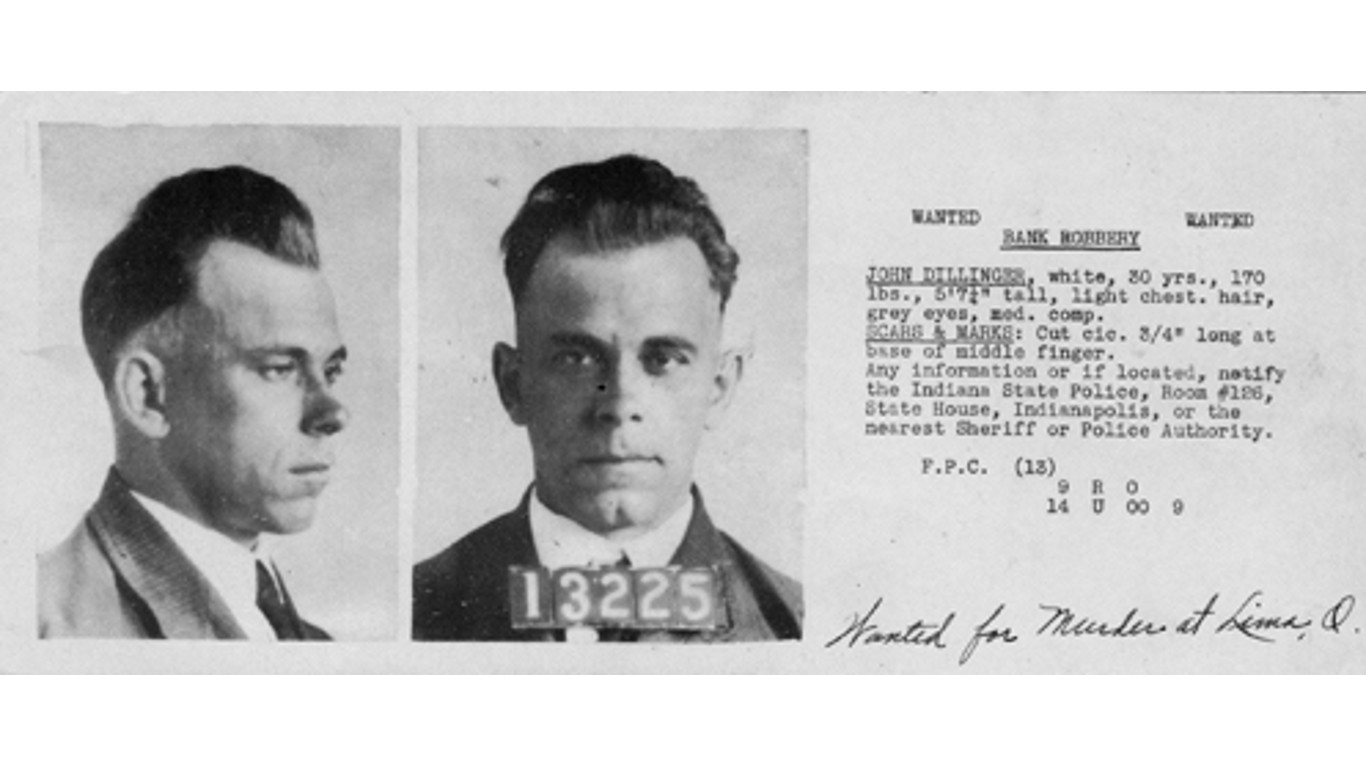
Indiana: John Dillinger
> Crime(s): Bank robbery, auto theft, murder
> When the crime(s) took place: 1930s
> Criminal(s)’s fate: Shot to death
One of the most famous Depression-era criminals in the nation, Dillinger robbed his first bank in 1933 and went on to rob 11 more with his so-called Dillinger Gang. During one robbery, a policeman was killed. After eluding authorities for several years, he was finally discovered at a Chicago movie theater, and was shot to death by FBI agents after he’d left the building.
[in-text-ad-2]

Iowa: Robert Hansen
> Crime(s): Rape, serial murder
> When the crime(s) took place: 1971-1983
> Criminal(s)’s fate: Died in prison
Known as “The Butcher Baker” after his chosen line of work (the latter), Hansen abducted, raped, and murdered at least 17 women in and around Anchorage, Alaska, and raped many more. He hunted many of them in the wilderness with a Ruger Mini-14 and a knife. Sentenced to 461 years in prison without possibility of parole, he died of natural causes at the age of 75 in the Anchorage hospital to which he had been temporarily transferred.
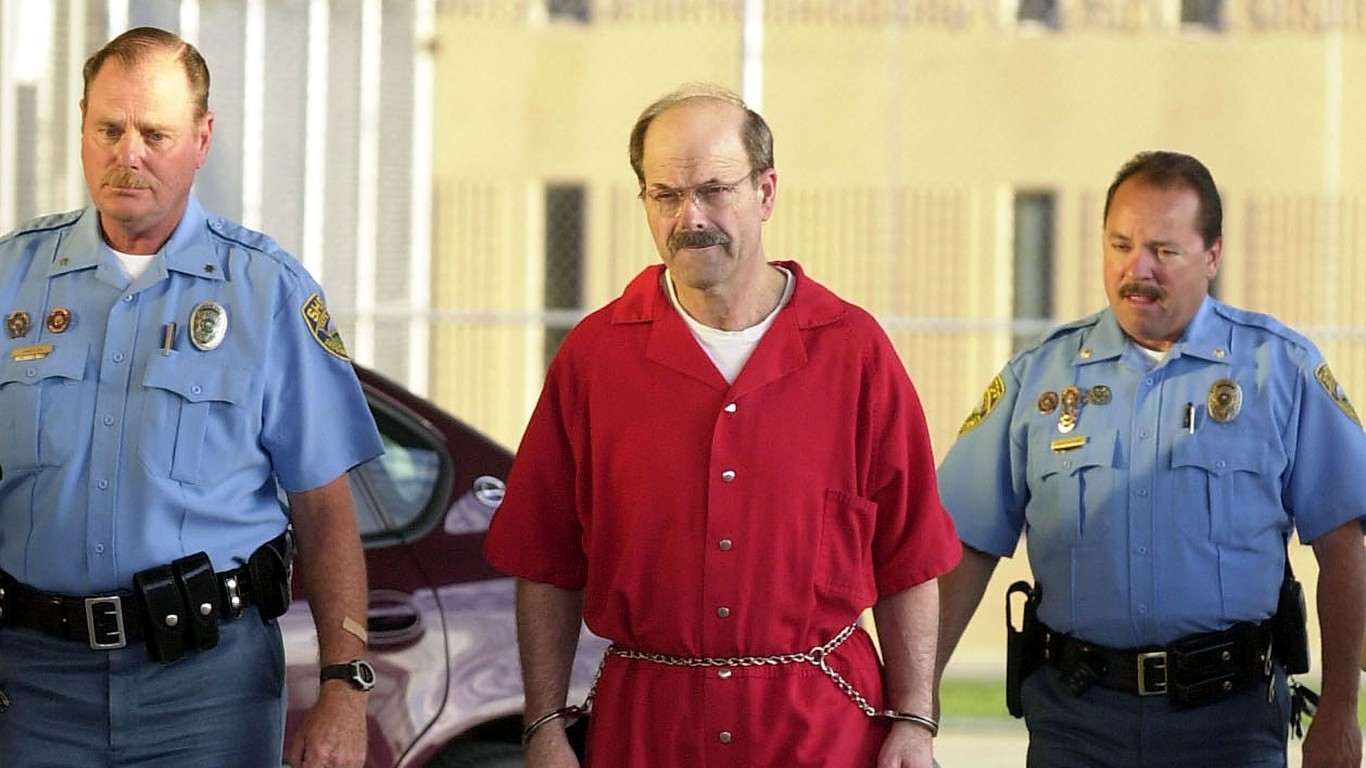
Kansas: Dennis Rader
> Crime(s): Torture, serial murder
> When the crime(s) took place: 1974-1991
> Criminal(s)’s fate: Serving 10 consecutive life terms
Rader styled himself “BTK,” an abbreviation for his modus operandi: He would bind, torture, and kill his victims. He sadistically murdered 10 people over a 17-year period in the Wichita area, and was sentenced to 175 years in prison – the equivalent of 10 life terms – without possibility of parole. He is incarcerated at El Dorado Correctional Facility in El Dorado, Kansas.
[in-text-ad]

Kentucky: Joseph Wesbecker
> Crime(s): Mass murder
> When the crime(s) took place: 1989
> Criminal(s)’s fate: Committed suicide
A disgruntled employee of Standard Gravure, a printing company in Louisville, shot eight of his co-workers and injured 12, reportedly while he was under the influence of Prozac. At the end of his hour-long shooting spree, he shot himself.
Louisiana: Sean Vincent Gillis
> Crime(s): Sexual assault, serial murder
> When the crime(s) took place: 1994-2004
> Criminal(s)’s fate: Serving life in prison without the possibility of parole
Originally charged with the ritualistic murders of three women in the Baton Rouge area, Gillie willingly confessed to having killed another five women, sometimes mutilating their bodies when they were dead.

Maine: James Purrington
> Crime(s): Mass murder
> When the crime(s) took place: 1806
> Criminal(s)’s fate: Committed suicide
In a crime that shocked small-town Maine (actually then still part of Massachusetts), James Purrington, a farmer who may have been a captain in the Revolutionary War, took an ax to his wife and eight children. Mrs. Purrington and six of the children died on the scene; one survived but died of her wounds several weeks later; and one was injured but lived. Purrington slit his own throat with a razor after the attack.
[in-text-ad-2]
Maryland: John Wilkes Booth
> Crime(s): Assassination
> When the crime(s) took place: 1865
> Criminal(s)’s fate: Died in shootout with federal troops
Booth, a well-known actor and member of a prominent theatrical family, was a Southern sympathizer who assassinated President Abraham Lincoln during a play at Ford’s Theater in Washington, D.C. Along with Lee Harvey Oswald, who shot JFK, he is by far the most infamous assassin in American history.
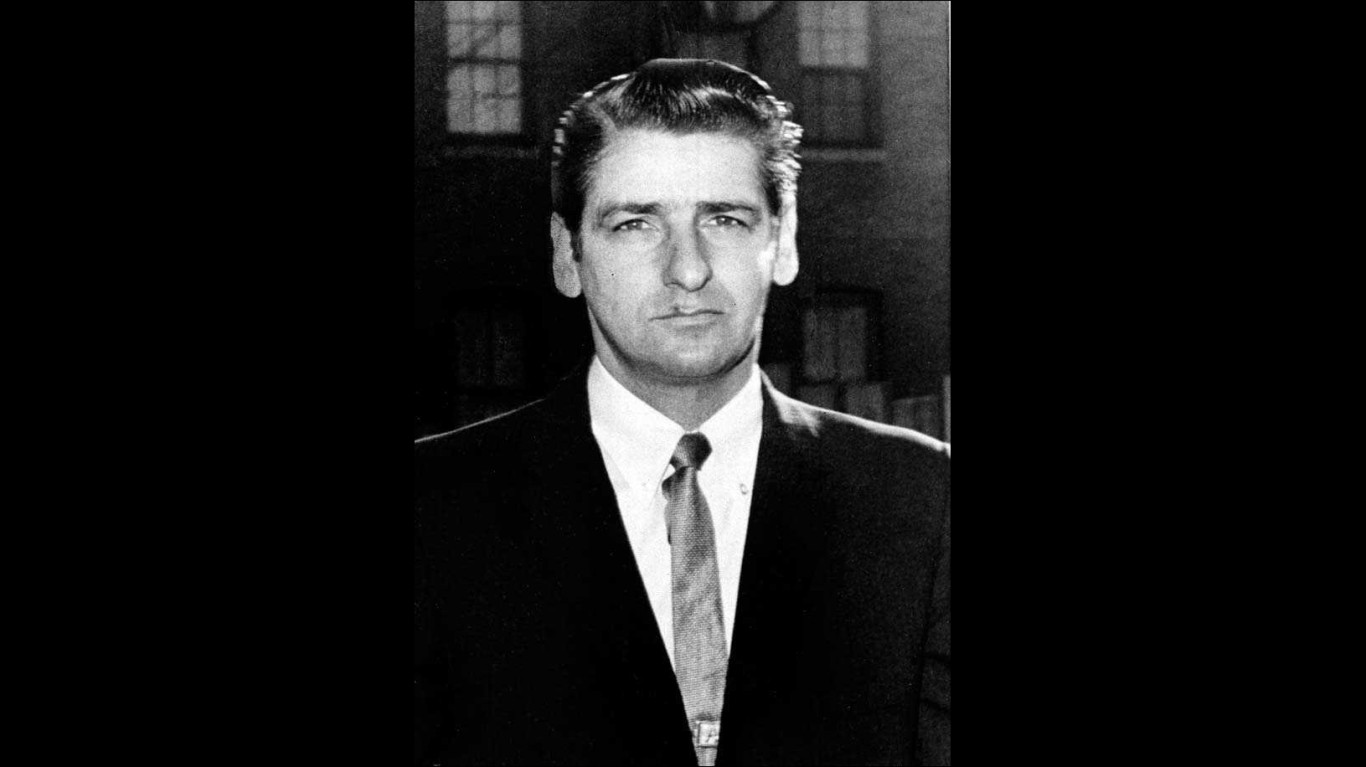
Massachusetts: Albert DeSalvo
> Crime(s): Rape, serial murder
> When the crime(s) took place: 1962-1964
> Criminal(s)’s fate: Killed in prison by another inmate
DeSalvo was imprisoned for life in 1967, not for murder but for numerous rapes – however he claimed to also be the so-called “Boston Strangler,” who killed 13 women in and around Boston in the early 1960s. He escaped from prison, and when he was recaptured, recanted his Strangler confession. However, in 2013, DNA evidence conclusively linked him to at least one of the killings.
[in-text-ad]
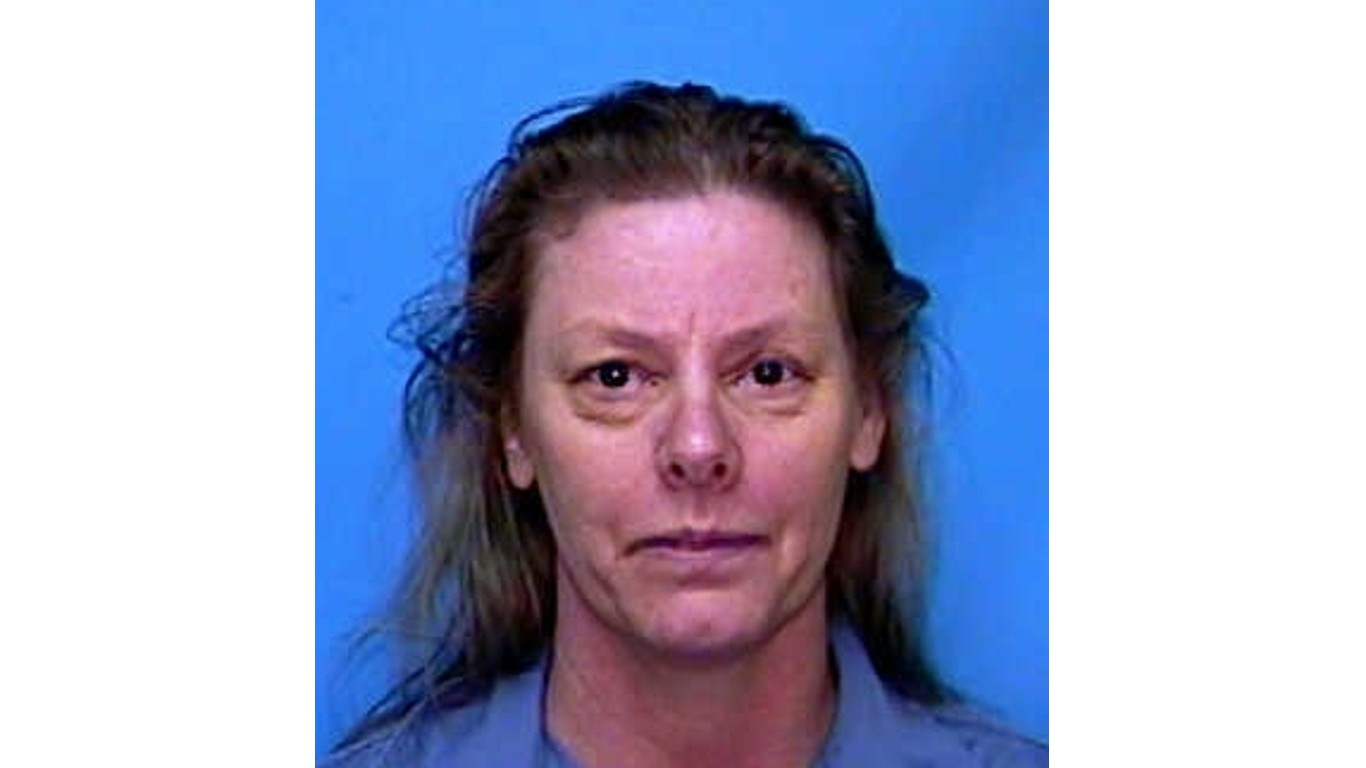
Michigan: Aileen Wuornos
> Crime(s): Serial murder
> When the crime(s) took place: 1989-1990
> Criminal(s)’s fate: Executed
Working as a prostitute along highways in Florida, Wuornos developed the habit of shooting and robbing her clients – dispatching seven of them in all over the span of a year. She claimed unsuccessfully in court that the men had tried to rape her and she had killed them in self-defense. Sentenced to death, Wuornos spent 12 years on death row before she was executed. Charlize Theron won a Best Actress Oscar for portraying Wuornos in the 2003 film “Monster.”
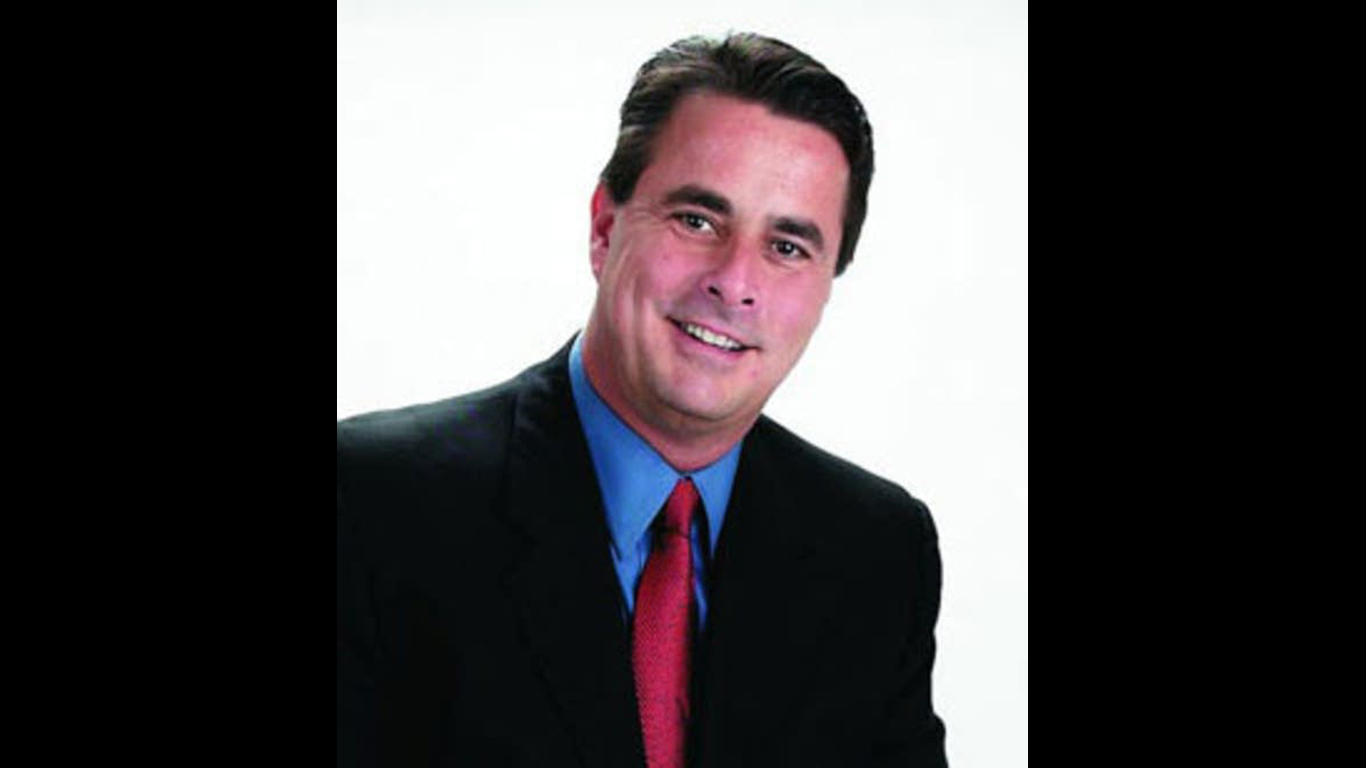
Minnesota: Tom Petters
> Crime(s): Wire fraud, mail fraud
> When the crime(s) took place: 1998-2008
> Criminal(s)’s fate: Serving a 50-year sentence
As chairman and CEO of Petters Group Worldwide, a diversified company with 3,200 employees and interests in 60 companies, including Sun Country Airlines, Petters operated the firm as a massive $3.65 billion Ponzi scheme involving fraudulent investments, fake loan documents, and more. The company filed for bankruptcy in 2008 and Petters was convicted the following year.
Mississippi: Roy Bryant and J.W. Milam
> Crime(s): Murder
> When the crime(s) took place: 1955
> Criminal(s)’s fate: Both died of cancer
In one of the most notorious anti-Black crimes of the 1950s – and there were plenty of other examples – Bryant and Milam, his half-brother, abducted, beat, and lynched an African-American teenager named Emmett Till and tossed his body into the river after he reputedly whistled at Bryant’s (white) wife, Carolyn, in the family grocery store. The men were acquitted, but both eventually died of cancer – Milam in 1980, Bryant in 1994.
[in-text-ad-2]
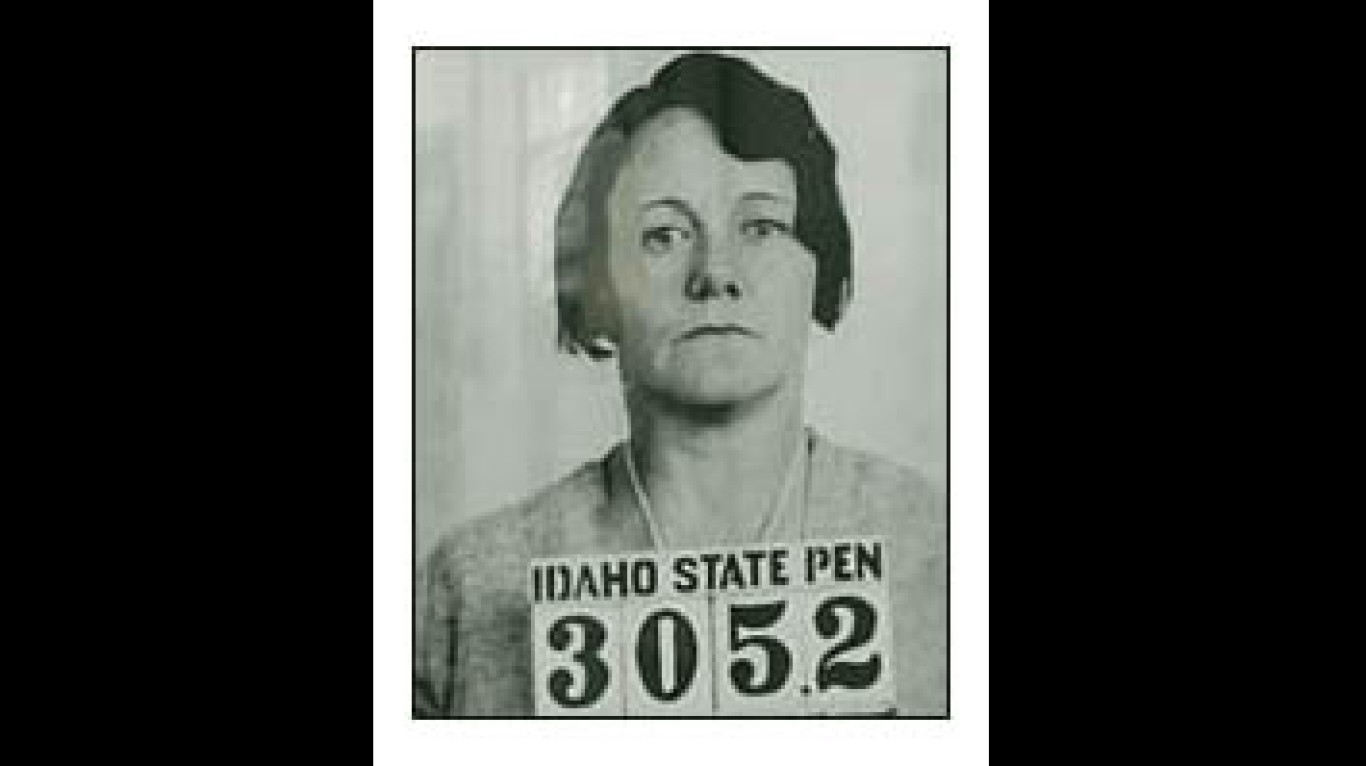
Missouri: Lyda Southard
> Crime(s): Serial murder
> When the crime(s) took place: 1915-1920
> Criminal(s)’s fate: Convicted, pardoned, and died of a heart attack
Nicknamed “Lady Bluebeard,” Southard allegedly killed four husbands, a brother-in-law, and her own daughter in Idaho and Montana by poisoning them with arsenic to collect their insurance money. Arrested in Hawaii, she was sentenced to 10 years to life. She escaped in 1931, remaining at large for a year before being returned to prison. Released on probation in 1941, she was pardoned by the governor of Idaho and died of a heart attack in 1958.
Montana: David Meirhofer
> Crime(s): Serial murder
> When the crime(s) took place: 1967-1974
> Criminal(s)’s fate: Committed suicide before trial
Meirhofer confessed to killing three children and a teenager in rural Montana, and was believed to have killed more – though later evidence implicated others in the additional crimes. While in his jail cell awaiting trial, he hung himself with a towel.
[in-text-ad]
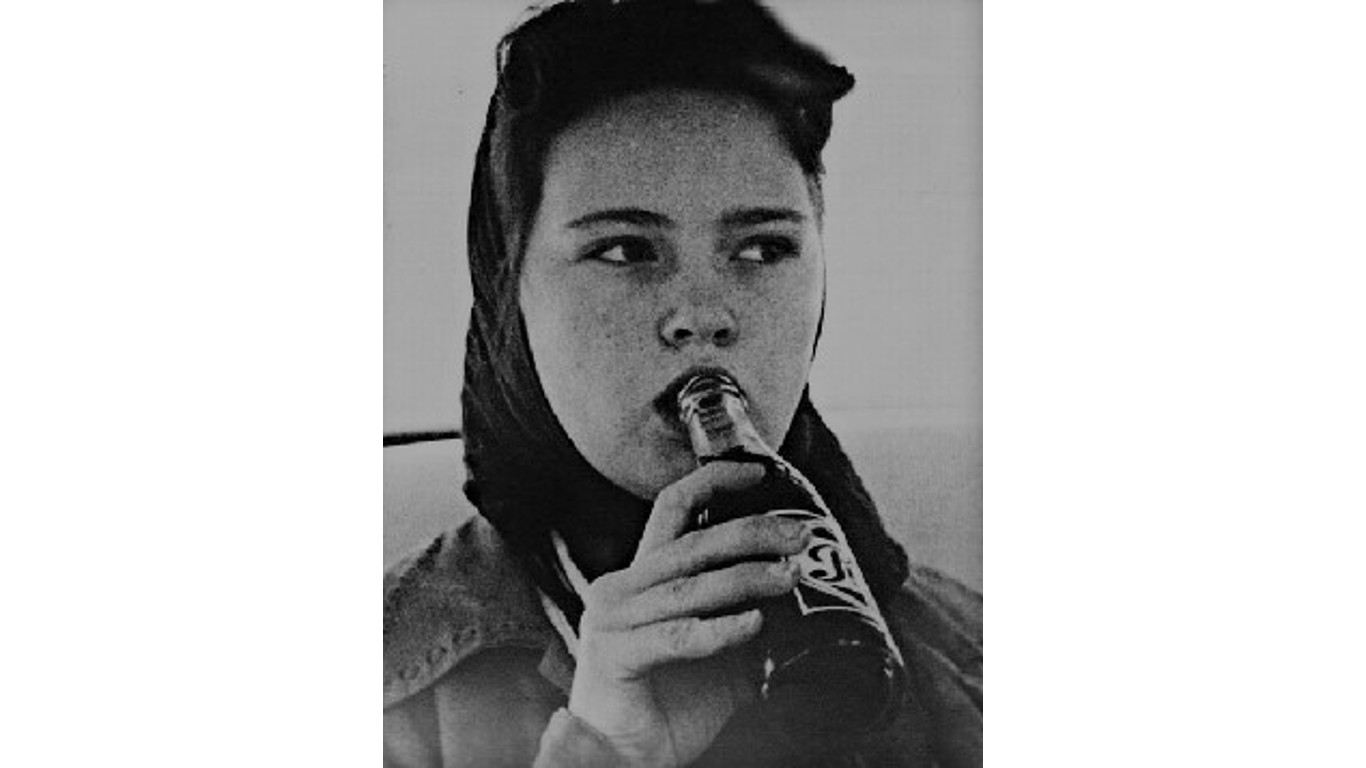
Nebraska: Charles Starkweather and Caril Ann Fugate
> Crime(s): Spree killing
> When the crime(s) took place: 1957-1958
> Criminal(s)’s fate: Starkweather executed; Fugate served 17 years and was paroled
The 19-year-old Starkweather and his 14-year-old girlfriend, Fugate, set off on a two-month killing spree in December 1957 that left 11 people dead in Nebraska and Wyoming. Before he was executed, Starkweather ungallantly declared that if he was to die, Fugate should too.

Nevada: Thomas Lee Bean
> Crime(s): Rape and murder
> When the crime(s) took place: 1963
> Criminal(s)’s fate: Serving life without possibility of parole
Bean, an 18-year-old high school student, raped, killed, decapitated, and attempted to flay British skier Sonja McCaskie, a former Olympics competitor who was working as a ski instructor, in Reno. The local police chief called it the most gruesome murder he had ever seen. Bean, who never offered a motive for his actions, was convicted in 1963 and sentenced to death, but the sentence was commuted to life without possibility of parole when the U.S. Supreme Court briefly outlawed the death penalty in 1972.

New Hampshire: Adam Lanza
> Crime(s): Mass murder
> When the crime(s) took place: 2012
> Criminal(s)’s fate: Committed suicide
In one of the most shocking crimes of the 21st century, 20-year-old Adam Lanza invaded Sandy Hook Elementary School in Newtown, Connecticut, on Dec. 14, 2012, and shot and killed 26 people – 20 of them 6- and 7-year-old children, the rest adult staff members. He had killed his mother earlier in the day, and took his own life at the scene of the crime..
[in-text-ad-2]

New Jersey: Richard Kuklinski
> Crime(s): Contract killing
> When the crime(s) took place: 1980s
> Criminal(s)’s fate: Died in prison
Dubbed “The Iceman” after it was discovered that he’d frozen the body of one of his victims, Kiklinski was convicted of five murders but claimed to have committed at least 100 more, including that of vanished Teamsters president Jimmy Hoffa, while he was working as a Mafia hitman. Law enforcement officials were skeptical of his claims. He died in prison in 2006 while serving four consecutive life sentences.

New Mexico: Esther Beckley and Shane Harrison
> Crime(s): Mass murder
> When the crime(s) took place: 1996
> Criminal(s)’s fate: Both serving life sentences
Beckley and Harrison abducted and murdered three employees of the Hollywood Video Store in Albuquerque and the grandparents of one staff member after a botched robbery attempt. The two were turned in by a part-time lover of Beckley’s.
[in-text-ad]
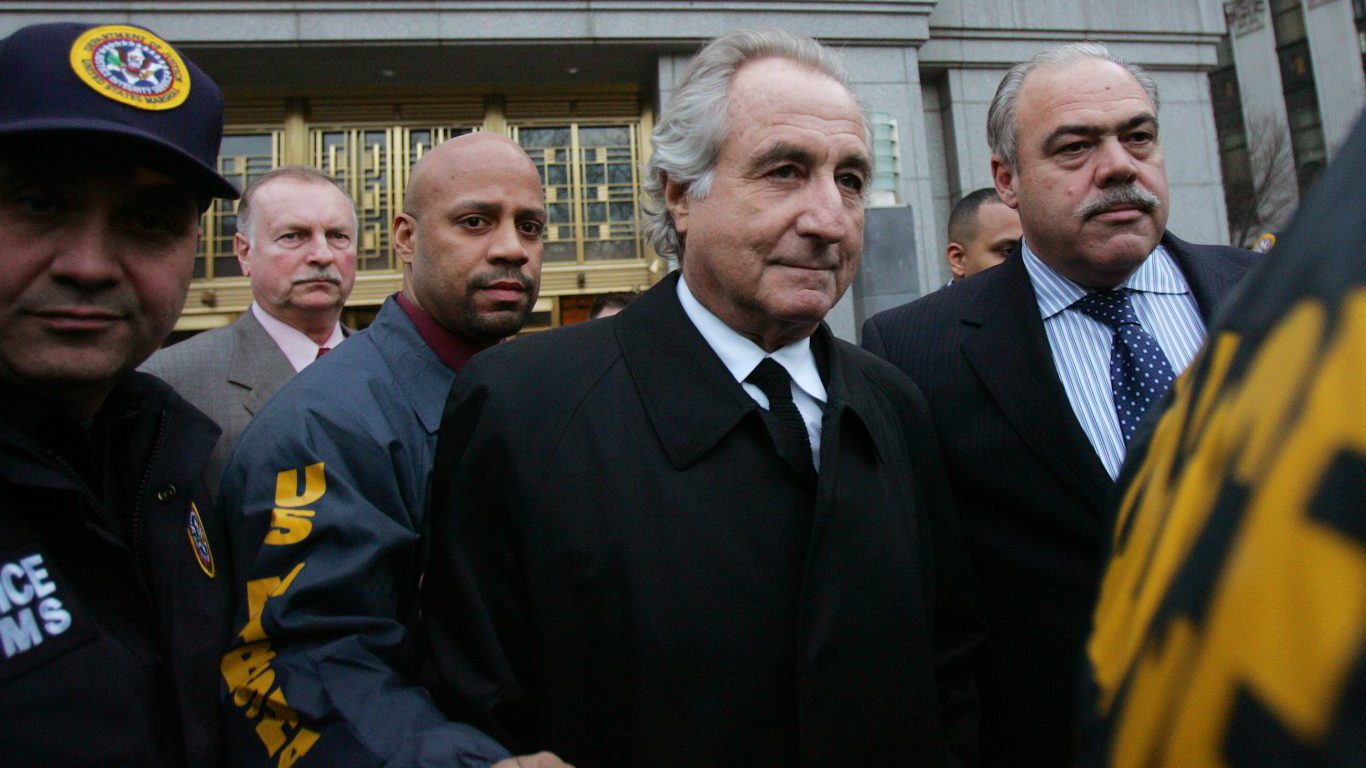
New York: Bernie Madoff
> Crime(s): Securities fraud, money laundering, etc.
> When the crime(s) took place: 1970s-2008
> Criminal(s)’s fate: Died in prison
Madoff’s brazen long-running Ponzi scheme defrauded thousands of investors, among them bold-faced names such as former Mets owner Fred Wilpon, actors Kevin Bacon and John Malkovich, director Steven Spielberg, and television host Larry King, over a period of more than 30 years. In 2009, Madoff was sentenced to 150 years in prison. After he fell ill, he asked then-president Donald Trump for a pardon but never got a response. He died of natural causes while serving his term at the age of 82.

North Carolina: Joseph Edward Duncan III
> Crime(s): Kidnapping, child molestation, serial murder
> When the crime(s) took place: 1977-2005
> Criminal(s)’s fate: Died in prison
In May 2005, in Idaho, Duncan murdered Brenda Groene; her boyfriend, Mark McKenzie; and Groene’s 13-year-old son – and abducted two other Groene children, 8-year-old Shasta and 9-year-old Dylan. Dylan’s remains were later found, but Shasta, who had been molested, escaped. He was also convicted of a 1977 murder in California, and confessed to the murders of two girls in Seattle. Sentenced to 11 consecutive life sentences without possibility of parole, Duncan died of brain cancer while in custody.
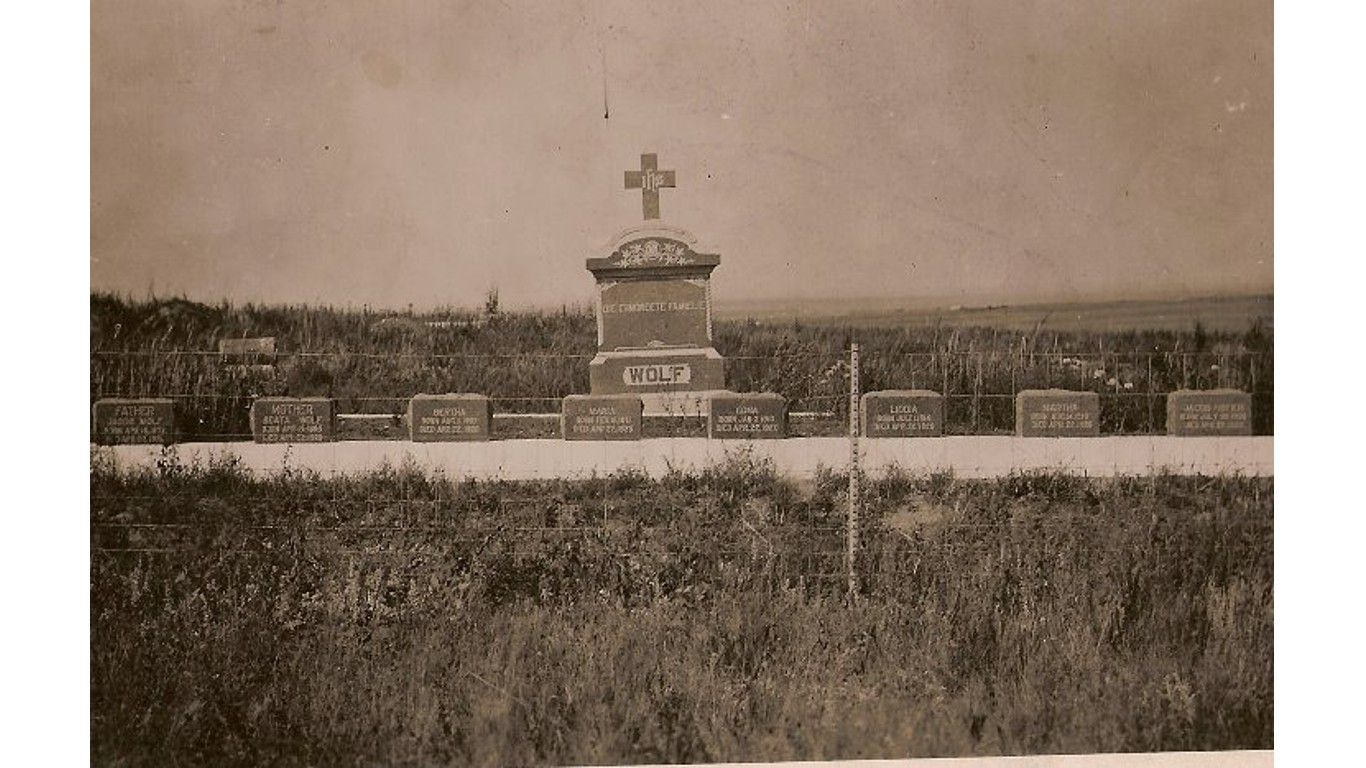
North Dakota: Henry Layer
> Crime(s): Mass murder
> When the crime(s) took place: 1920
> Criminal(s)’s fate: Died in prison
Layer confessed to the murders of seven members of the Wolf family, prosperous farmers in Turtle Lake, North Dakota, as well as their farmhand. The Wolfs’ 8-month-old baby was the only survivor of the carnage. After serving five years of a life sentence at hard labor, Layer died after an operation for appendicitis.
[in-text-ad-2]
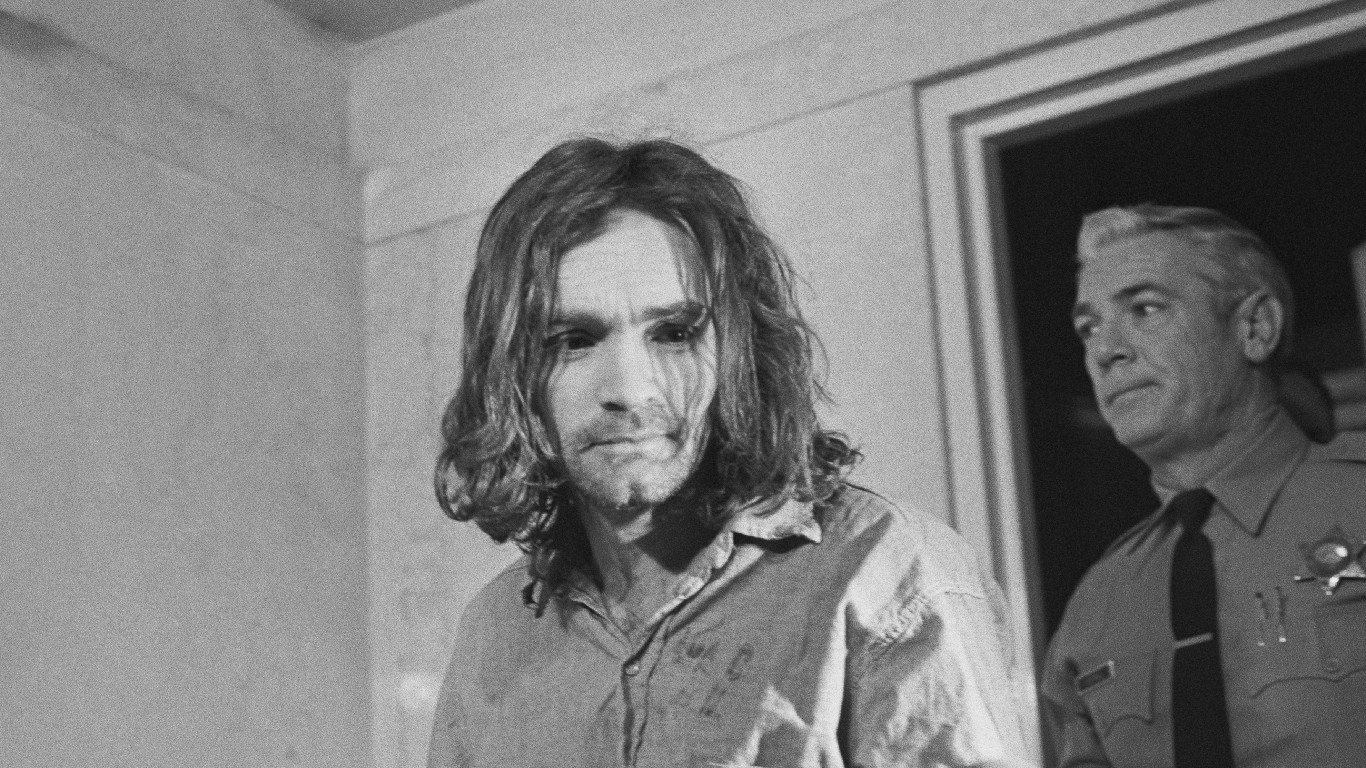
Ohio: Charles Manson
> Crime(s): Serial murder and conspiracy to commit murder
> When the crime(s) took place: 1969
> Criminal(s)’s fate: Died in prison
Arguably the most notorious – and until his arrest, the most feared – American murderer of the latter 20th century, Manson didn’t take part himself in the infamous Tate-La Bianca murders of August, 1969, though he inspired and perhaps directly ordered them, which was enough to get him convicted for the crimes in 1971. Later the same year he was additionally convicted of two earlier murders. The charges were enough to earn him a death sentence for murder and conspiracy to commit murder – later commuted to life imprisonment. He died in jail in 2017.
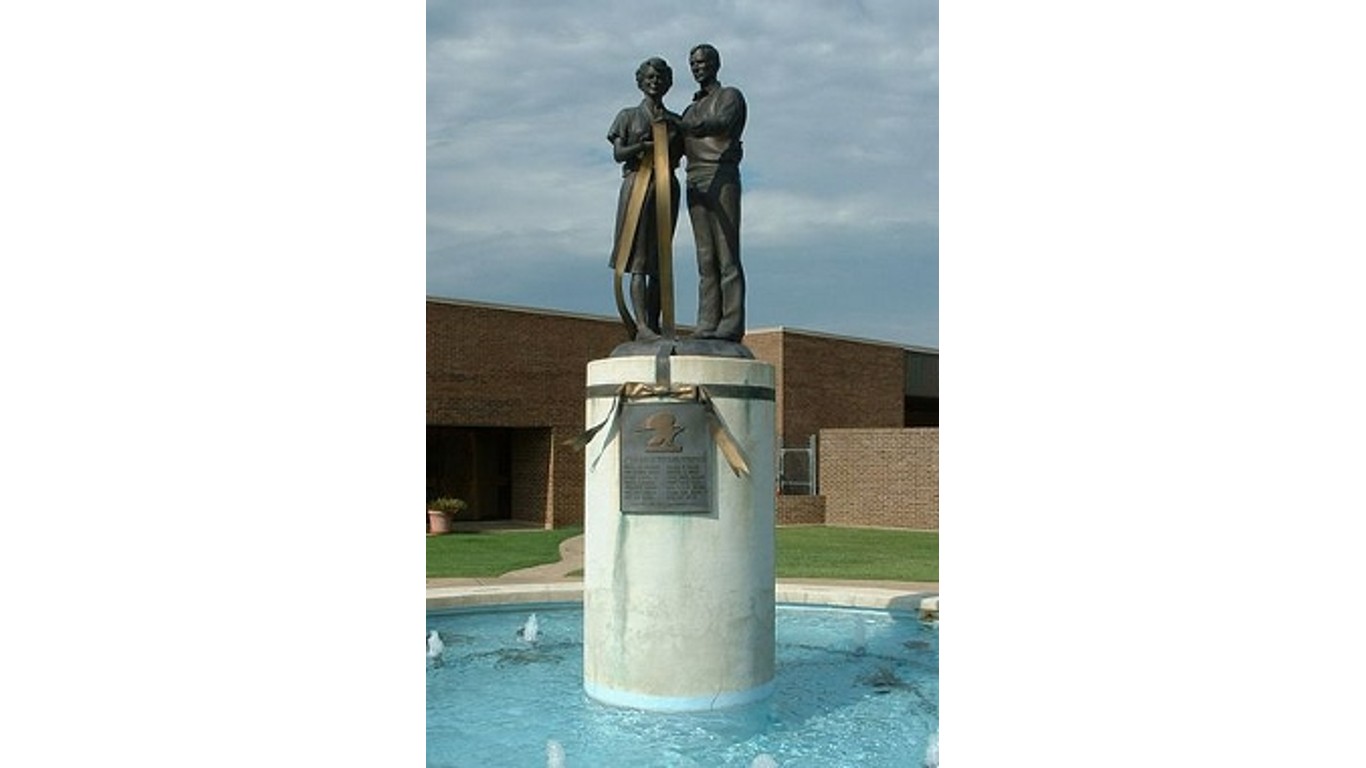
Oklahoma: Patrick Henry Sherrill
> Crime(s): > Mass murder
> Criminal(s)’s fate: Committed suicide
When the crime(s) took place: 1986
The phrase “going postal,” meaning resorting to acts of extreme violence in a workplace environment, first appeared in 1983, but it was the crazed shooting attack by relief mail carrier Sherrill three years later – in which 14 of his co-workers were slain and six more injured before he turned a gun on himself – that helped make the concept all too commonplace.
[in-text-ad]

Oregon: Rita “Bo” Brown
> Crime(s): Bank robbery
> When the crime(s) took place: 1970s
> Criminal(s)’s fate: Served eight years in jail; died in 2021
A queer liberation activist and member of the revolutionary George Jackson Brigade, Brown and her colleagues held armed robbery “fund-raisers” to obtain cash for themselves and to funnel to various other anti-war and civil rights action groups. Christened “The Gentleman Bank Robber” for her masculine style of dress and reported politeness when demanding money, Brown was convicted of robbing several financial institutions and served eight years in jail. She died in 2021 after a long fight against Lewy Body dementia.
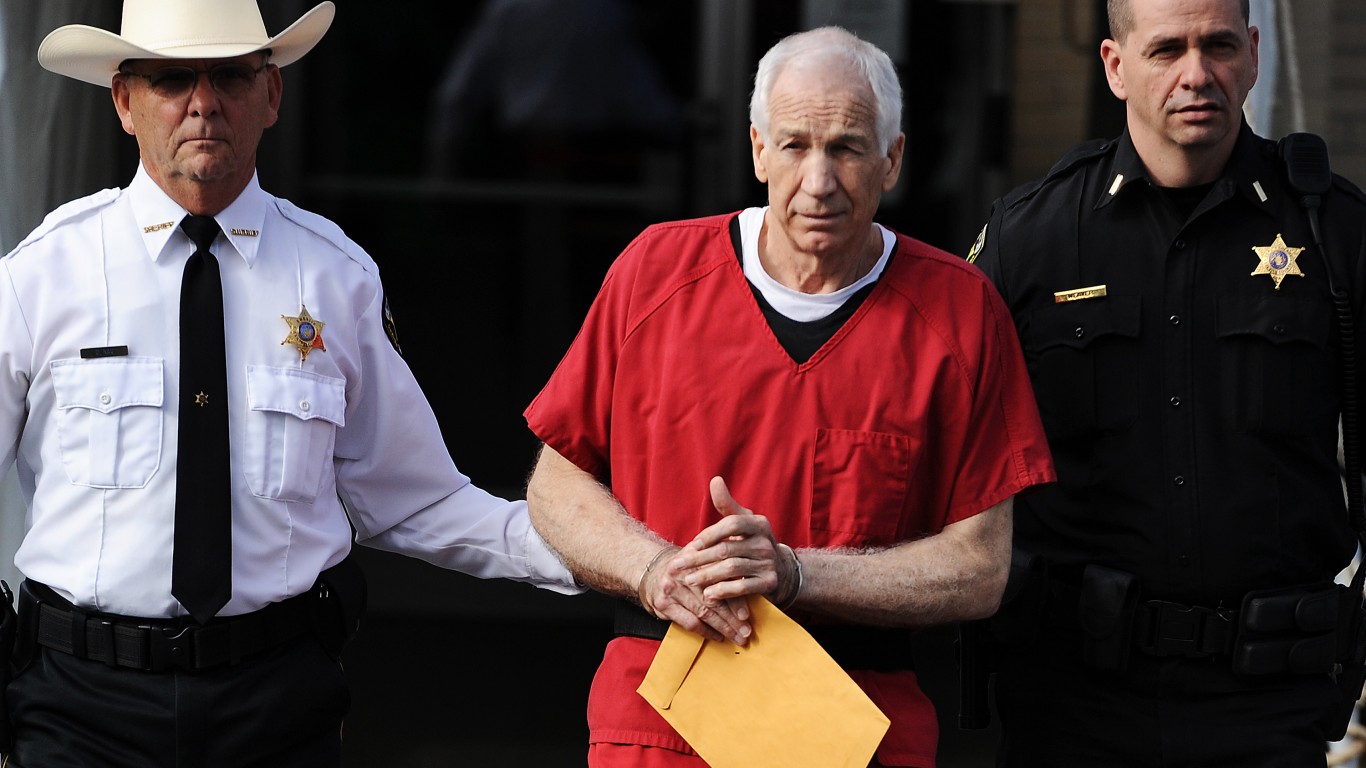
Pennsylvania: Jerry Sandusky
> Crime(s): Child molestation, sexual assault, and related offenses
> When the crime(s) took place: 1994-2009
> Criminal(s)’s fate: In prison till at least 2042, when he would be 98 years old
A well-liked football coach at Penn State University for decades, Sandusky led a secret life: In 2011, a grand jury indicted him on 40 counts of sexually abusing young boys, with 12 additional counts later added. Convicted of 45 of the charges, he was sentenced to 30 to 60 years in prison.
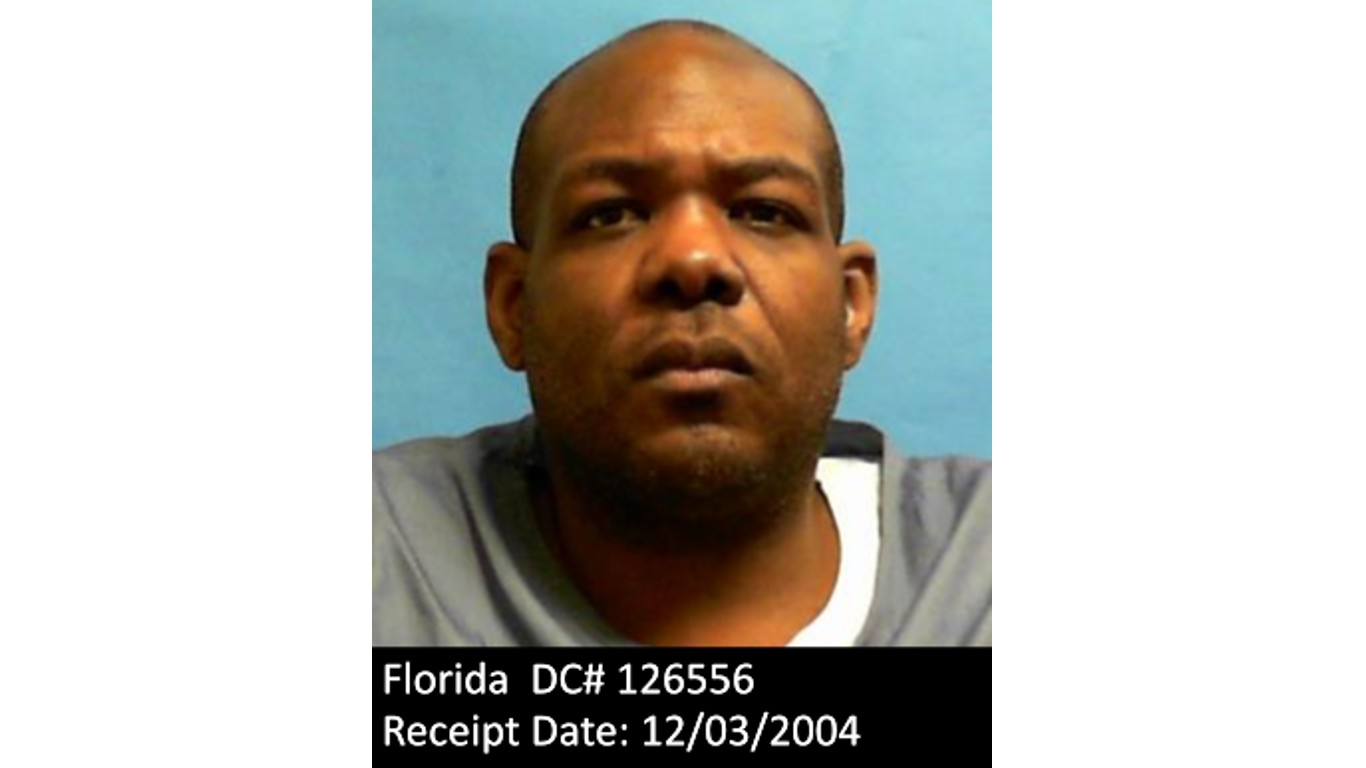
Rhode Island: Craig Price
> Crime(s): Serial murder
> When the crime(s) took place: 1987-1989
> Criminal(s)’s fate: Incarcerated
NIcknamed “The Warwick Slasher,” Price shockingly committed his brutal murders – a woman in 1987 and another woman and her two daughters two years later – when he was between the ages of 13 and 15, giving him the dubious honor of being the youngest serial killer the nation has ever known. He was sentenced to 25 years in prison, but further offenses while he was behind bars added another 10-25 years to his term.
[in-text-ad-2]
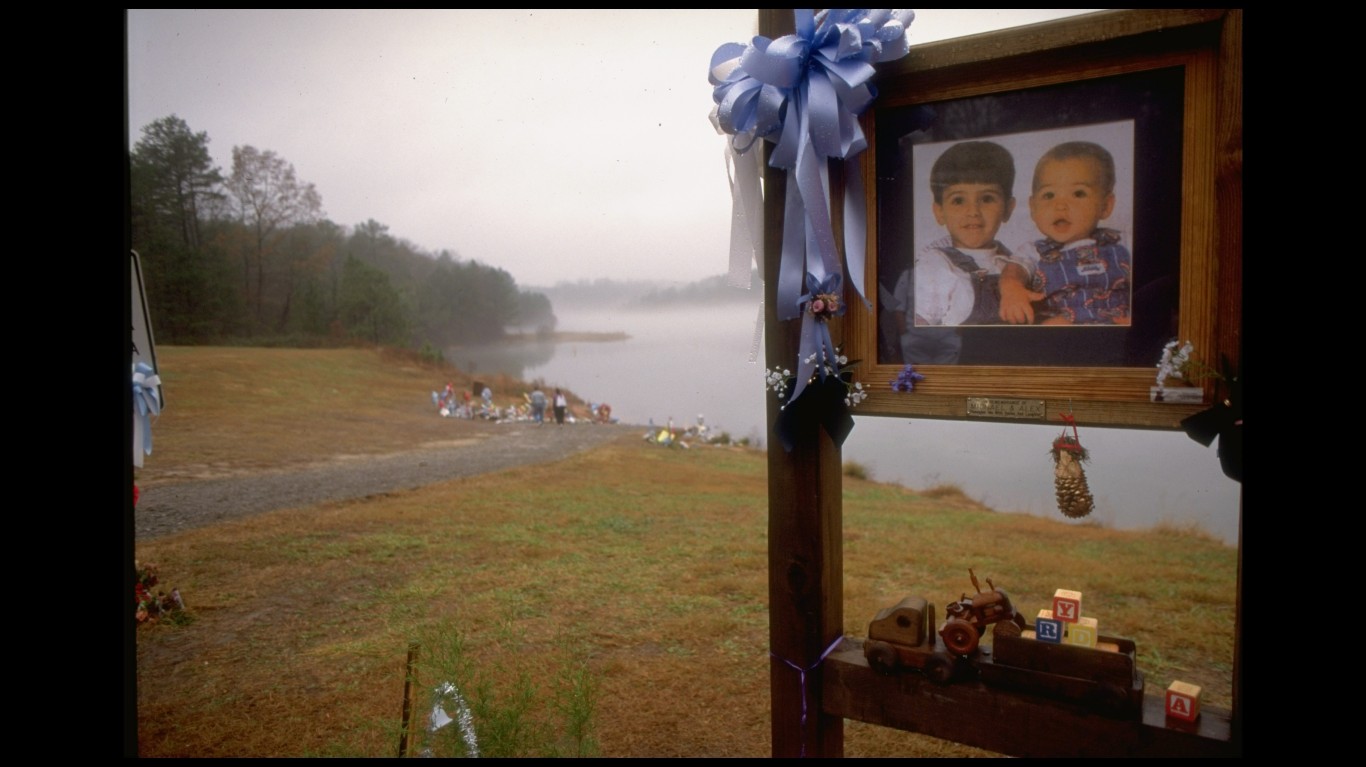
South Carolina: Susan Smith
> Crime(s): Infanticide
> When the crime(s) took place: 1994
> Criminal(s)’s fate: Incarcerated; eligible for parole in 2024.
This South Carolina mom shocked the nation when she confessed that she had strapped her two children, aged 14 months and 3 years, into their car seats and let the vehicle roll into John D. Long Lake, where they drowned. She originally claimed that a black man had kidnapped her sons during a carjacking.
South Dakota: Robert Leroy Anderson
> Crime(s): Kidnapping, rape, and murder
> When the crime(s) took place: 1996
> Criminal(s)’s fate: Committed suicide in jail
In 1999, a jury found Anderson guilty of kidnapping and killing Larisa Dumansky of Sioux Falls in 1994 and raping and killing Piper Streyle of Canistota in 1996. He was sentenced to death, but killed himself in an isolation cell before the sentence could be carried out. His friend Glen Walker, who helped Anderson kidnap Dumansky, got a 30-year sentence, but was released early for good behavior.
[in-text-ad]
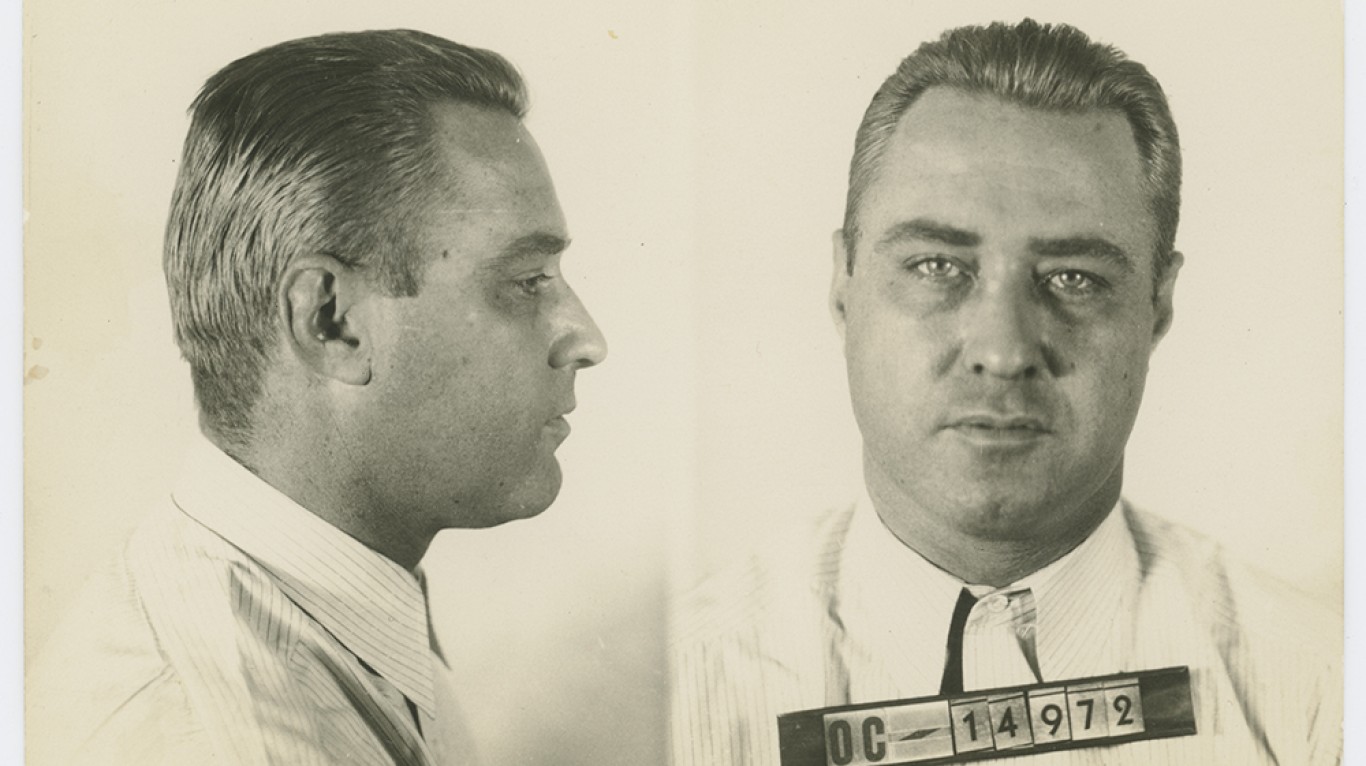
Tennessee: Machine Gun Kelly
> Crime(s): Kidnapping, bootlegging
> When the crime(s) took place: 1930s
> Criminal(s)’s fate: Captured and sent to Alcatraz where he died in 1954.
George “Machine Gun Kelly” Barnes was a Depression-era bootlegger who turned to kidnapping in 1933, when he and his wife, Kathryn, seized two wealthy Oklahoma City businessmen and held them for ransom. The FBI tracked the Kellys down in Memphis and arrested them. The Kellys were both convicted and sentenced to life imprisonment. “Machine Gun” was first incarcerated at the U.S. Penitentiary in Leavenworth, Kansas, then moved to Alcatraz for 17 years. Subsequently returned to Leavenworth, he died there of a heart attack in 1954. His wife was released in 1958 and died in 1985.
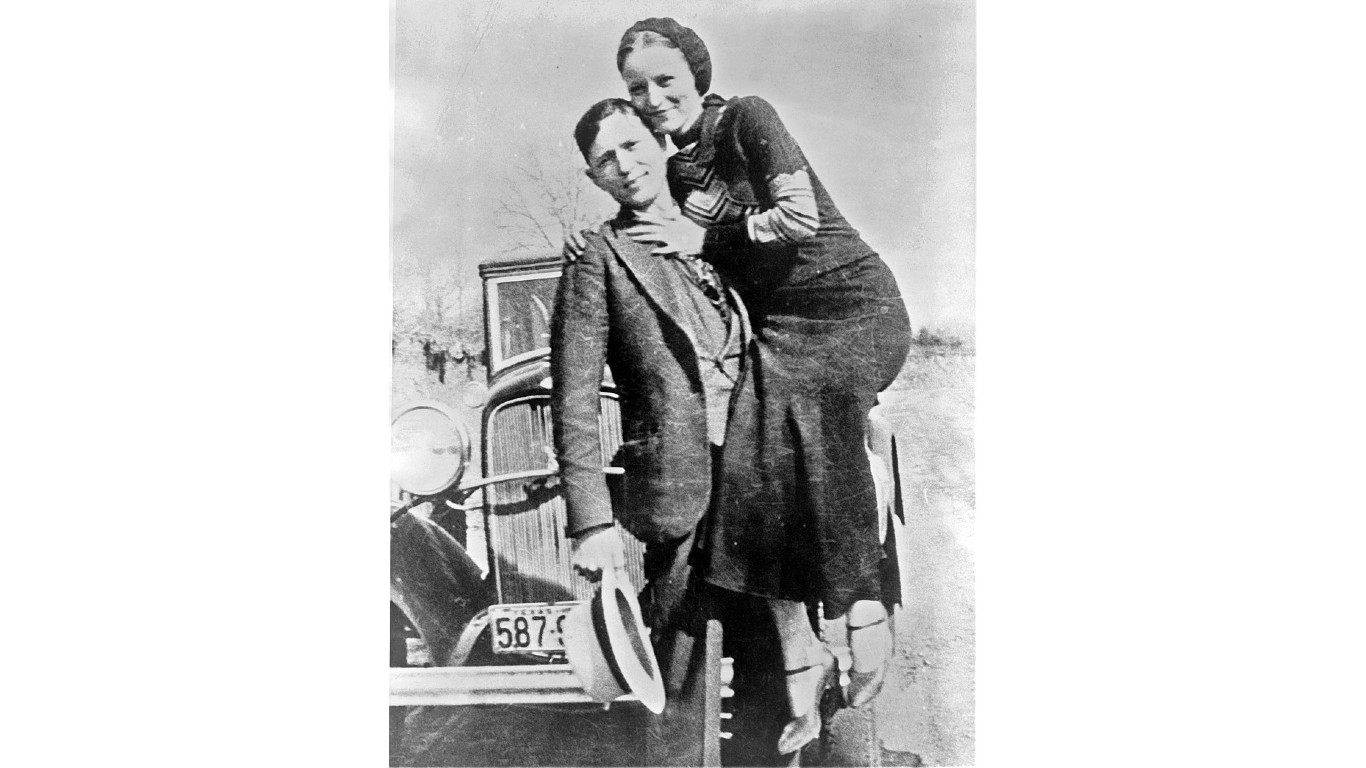
Texas: Bonnie Parker and Clyde Barrow
> Crime(s): Bank robbery, murder
> When the crime(s) took place: Early 1930s
> Criminal(s)’s fate: Ambushed and killed by law enforcement
This fabled team of Depression-era criminals who robbed banks in Texas, Oklahoma, and Louisiana, among other states, killing nine people, including policemen and civilians, along the way. Texas Ranger Frank Hamer became obsessed with hunting them down, and in 1934, in Bienville Parish, Louisiana, he and some fellow rangers and local police officers ambushed the two, killing them in a hail of bullets.
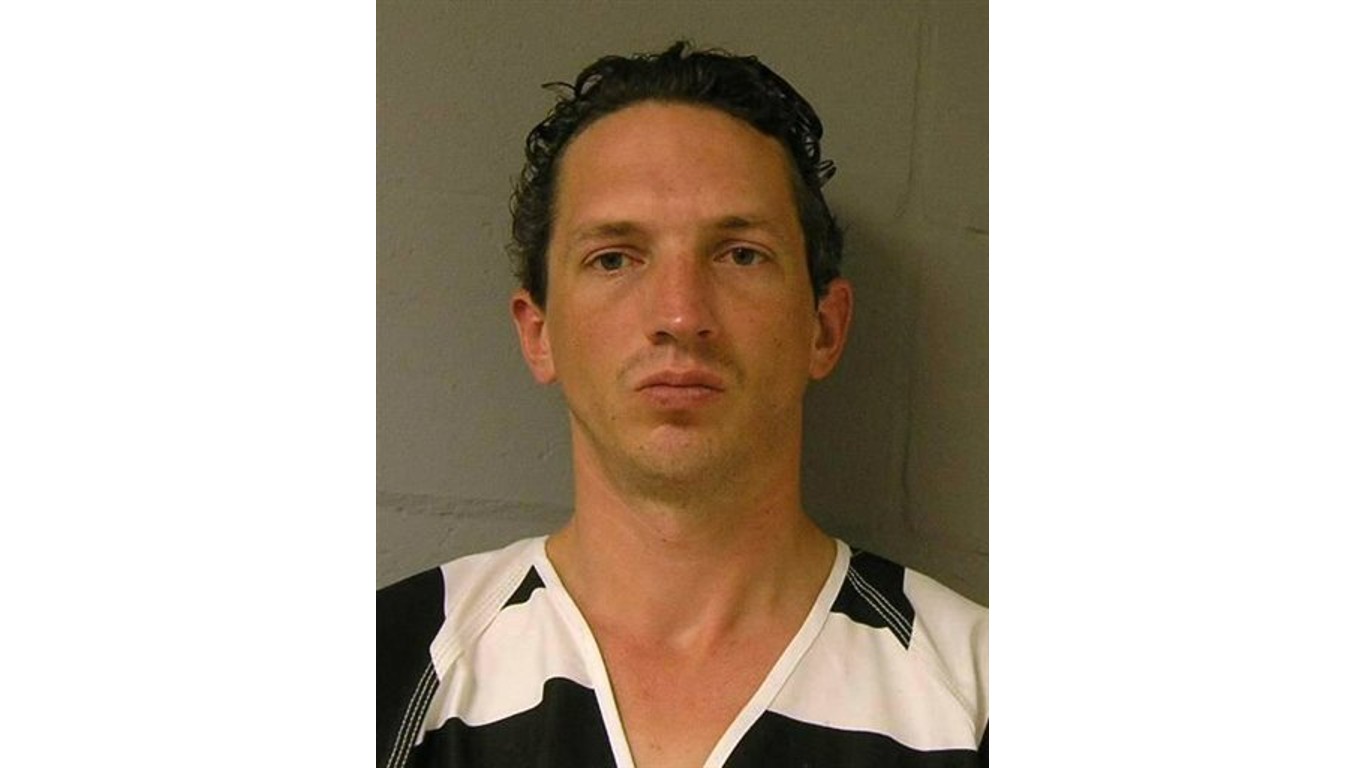
Utah: Israel Keyes
> Crime(s): Armed robert, rape, arson, serial murder
> When the crime(s) took place: 1996-2012
> Criminal(s)’s fate: Committed suicide
Keyes murdered at least three people and may have killed 11 in all, as well as committing dozens of other felonies, beginning with the sexual assault of a teenage girl in Oregon in 1996. He was arrested in Texas and extradited to Alaska, where he faced one murder charge, but killed himself in his cell while being held.
[in-text-ad-2]
Vermont: Ted Bundy
> Crime(s): Kidnapping, rape, serial murder
> When the crime(s) took place: 1974-1978
> Criminal(s)’s fate: Executed
Nobody knows for sure how many victims this outwardly charming sadistic killer claimed. He confessed to 30 murders across the Western states and Florida, of which 20 have been confirmed, and some authorities believed that there were many more. Even one of his defense attorneys described him as “the very definition of heartless evil.” Given two death sentences, he escaped from jail twice before being finally recaptured and put to death.

Virginia: Leslie Leon Burchart
> Crime(s): Serial murder
> When the crime(s) took place: 1994-1996
> Criminal(s)’s fate: Died in jail.
Richmond-born Burchart was convicted of killing three homeless men in his hometown, but later confessed to having also taken part in the city’s unsolved “Golden Age Murders,” which claimed the lives of at least 13 elderly women in the early 1990s. Given five life sentences, Burchart died from cardiovascular issues in 2002.
[in-text-ad]
Washington: Robert Lee Yates
> Crime(s): Serial murder
> When the crime(s) took place: 1975-1998
> Criminal(s)’s fate: Serving a 408-year sentence
After shooting two college students on a picnic, Yates went on to kill as many as 15 other people, many of them sex workers, around Spokane and elsewhere. He was sentenced to death in 2002, but Gov. Jay Inslee placed a moratorium on the death penalty and instead Yates is serving a life sentence without possibility of parole.
West Virginia: Shelia Eddy and Rachel Shoaf
> Crime(s): Murder
> When the crime(s) took place: 2012
> Criminal(s)’s fate: Eddy: serving life in prison with possibility of parole; Shoaf: serving 30 years
Giving new meaning to the concept of “mean girls,” Eddy and Shoaf, two students at University High School in Star City, West Virginia, stabbed classmate Sklar Neese to death in Pennsylvania in 2012, apparently for no better reason than that, as Shoaf said, they “didn’t want to be friends with her anymore.” Shoaf eventually admitted the crime and the two were tried and convicted.

Wisconsin: Jeffrey Dahmer
> Crime(s): Serial murder, cannibalism
> When the crime(s) took place: 1978-1991
> Criminal(s)’s fate: Killed in prison
The so-called Milwaukee Monster claimed at least 17 victims in Wisconsin and Ohio over a 13-year period. Adding to the horror of his crimes was the fact that he dismembered those he killed, sometimes storing body parts in his freezer, sometimes eating portions of their flesh. He also had sex with some of the just-slain bodies. Given 16 life sentences, amounting to 941 years in all, he was bludgeoned to death by a fellow inmate in 1994.
[in-text-ad-2]

Wyoming: Russell Henderson and Aaron McKinney
> Crime(s): Murder
> When the crime(s) took place: 1998
> Criminal(s)’s fate: Serving life sentences
Henderson and McKinney beat gay student Matthew Shepard in 1998, delivering the death blow while he was lashed to a fence, in a key case that shocked the nation and pushed forward hate-crime laws.
Thank you for reading! Have some feedback for us?
Contact the 24/7 Wall St. editorial team.